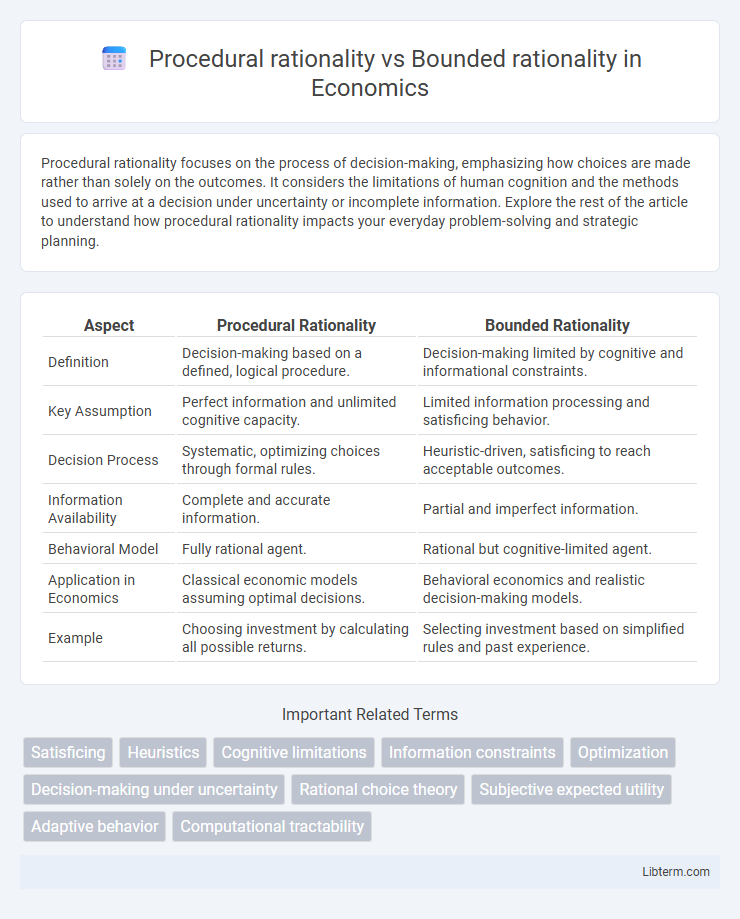Procedural rationality focuses on the process of decision-making, emphasizing how choices are made rather than solely on the outcomes. It considers the limitations of human cognition and the methods used to arrive at a decision under uncertainty or incomplete information. Explore the rest of the article to understand how procedural rationality impacts your everyday problem-solving and strategic planning.
Table of Comparison
| Aspect | Procedural Rationality | Bounded Rationality |
|---|---|---|
| Definition | Decision-making based on a defined, logical procedure. | Decision-making limited by cognitive and informational constraints. |
| Key Assumption | Perfect information and unlimited cognitive capacity. | Limited information processing and satisficing behavior. |
| Decision Process | Systematic, optimizing choices through formal rules. | Heuristic-driven, satisficing to reach acceptable outcomes. |
| Information Availability | Complete and accurate information. | Partial and imperfect information. |
| Behavioral Model | Fully rational agent. | Rational but cognitive-limited agent. |
| Application in Economics | Classical economic models assuming optimal decisions. | Behavioral economics and realistic decision-making models. |
| Example | Choosing investment by calculating all possible returns. | Selecting investment based on simplified rules and past experience. |
Defining Procedural Rationality
Procedural rationality refers to the decision-making process that emphasizes the methods and steps taken to reach a conclusion rather than the optimality of the outcome. It focuses on the cognitive limitations and information-processing procedures individuals use within complex environments. Unlike classical rationality assumptions, procedural rationality acknowledges constraints such as limited computational capacity and incomplete information, aligning closely with Herbert Simon's theories of decision-making.
Understanding Bounded Rationality
Bounded rationality recognizes human cognitive limitations and incomplete information during decision-making, contrasting with the idealized concept of procedural rationality which assumes flawless logic and unlimited processing capacity. It emphasizes satisficing--seeking acceptable rather than optimal solutions--due to constraints in time, knowledge, and computational abilities. This approach reflects realistic decision processes in economics and cognitive science, helping explain deviations from perfectly rational behavior.
Historical Origins of Both Concepts
Procedural rationality originated from Herbert A. Simon's critique of classical economic theory in the 1950s, emphasizing decision-making processes under limited information and cognitive constraints. Bounded rationality, also introduced by Simon, expanded on this by modeling human cognition as inherently limited by finite computational capacities and imperfect knowledge. These concepts emerged as foundational shifts from the assumption of perfect rationality, highlighting realistic human decision-making in complex environments.
Core Principles of Procedural Rationality
Procedural rationality emphasizes decision-making grounded in systematic processes, focusing on the methods and steps individuals use to arrive at choices rather than solely on outcomes. Core principles include satisficing behavior, where decision-makers seek satisfactory solutions within cognitive limitations, and the iterative assessment of alternatives considering available information and computational capabilities. This approach contrasts with perfect optimization by acknowledging human cognitive constraints and the importance of algorithmic strategies in problem-solving.
Key Features of Bounded Rationality
Bounded rationality emphasizes limitations in human decision-making due to cognitive constraints, incomplete information, and finite time for processing data. Its key features include satisficing behavior, where individuals seek solutions that are "good enough" rather than optimal, and the use of heuristics or rules of thumb to simplify complex choices. Unlike procedural rationality, which assumes fully rational processes aiming for the best outcome, bounded rationality acknowledges practical decision-making within real-world constraints.
Decision-Making Processes: Procedural vs. Bounded
Procedural rationality emphasizes decision-making through systematic and logical steps, optimizing choices based on a predefined algorithm or rule set. Bounded rationality acknowledges cognitive limitations and incomplete information, leading decision-makers to satisfice rather than maximize outcomes. These contrasting approaches highlight the tension between idealized optimization models and practical human problem-solving constraints in organizational and behavioral economics.
Cognitive Limitations and Rationality
Procedural rationality emphasizes decision-making processes constrained by cognitive limitations such as limited information processing and time, highlighting how individuals seek satisfactory solutions rather than optimal ones. Bounded rationality acknowledges these cognitive constraints, proposing that rationality is limited by the mental capacities of decision-makers and the complexity of the environment. Both concepts underscore the impact of cognitive limitations on rational behavior, stressing realistic decision models over idealized, fully rational choices.
Real-World Applications and Case Studies
Procedural rationality emphasizes decision-making processes aligned with available information and cognitive limitations, often applied in organizational behavior and AI systems for optimizing workflow efficiency. Bounded rationality focuses on satisficing under constraints such as limited information and time, commonly observed in consumer behavior and emergency response scenarios where perfect optimization is impractical. Case studies in urban planning and healthcare demonstrate how integrating these models enhances adaptive strategies and resource allocation in complex, real-world environments.
Comparing Strengths and Weaknesses
Procedural rationality excels in structured decision-making by emphasizing clear rules and consistent processes, enhancing predictability and replicability but often lacking flexibility in dynamic environments. Bounded rationality accounts for human cognitive limitations and incomplete information, offering realistic adaptability but potentially leading to satisficing rather than optimizing outcomes. Comparing strengths, procedural rationality ensures systematic analysis while bounded rationality promotes practical solutions under uncertainty; weaknesses include procedural rigidity versus bounded rationality's risk of suboptimal decisions.
Implications for Future Research and Practice
Procedural rationality emphasizes the importance of the decision-making process under conditions of uncertainty, guiding future research to develop models that better capture how individuals realistically gather and process information. Bounded rationality highlights cognitive limitations and environmental constraints, suggesting practical interventions should focus on simplifying decision environments and enhancing heuristics to improve outcomes. Future studies might integrate these frameworks to design adaptive systems and decision aids that align more closely with human cognitive capabilities and real-world complexities.
Procedural rationality Infographic

 libterm.com
libterm.com